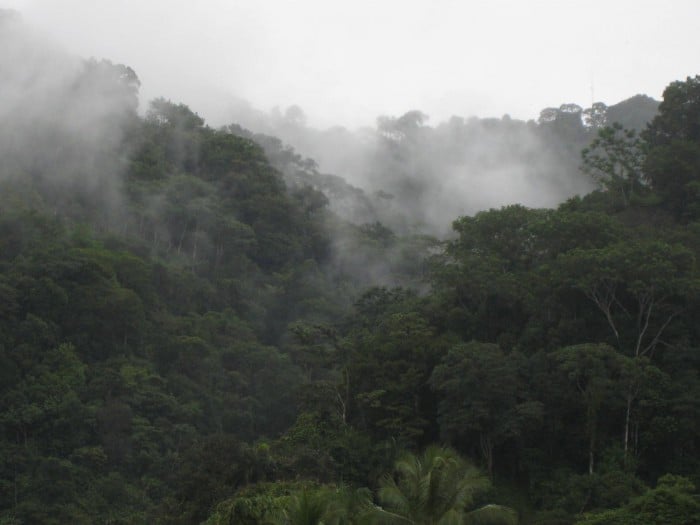Karen left L.A. the day she got out of high school. Even in the fast-changing 1960s, the city held no allure for the sharp-eyed, petite blonde. She wandered up to a freethinking Oregon commune only to find it filled with fellow Californians, tie-dyed and bearded.
She thumbed to Alaska, worked the salmon boats, then down to the Caribbean and worked the charter boats. Her wanderings whetted an appetite for the unknown. The more she traveled, the more unsettled she became. One day, she found herself with a small band of friends in the steamy outpost of Dominical on Costa Rica’s still-wild southern Pacific shores.
Drawn to the lush beauty of the surrounding jungle, Karen packed a small knapsack, sheathed her machete and bid farewell to friends and the tiny village. She marched into the verdant mountains that loom over the rugged southern coastline, and for days she clamored over massive logs, ducked under serpentine vines and slipped down muddy game trails. At night she sat enthralled with the raucous silence of the jungle.
The cough of the jaguar and the unholy grunts of howler monkeys served only to erase her ties to civilization. Torn by the vicious undergrowth and donor to a thousand bloodsucking insects, the longer she trekked, the more at home she became. In the fog-shrouded mountains high above Pinula Beach, Karen came upon a smoky cabin. Yelling a greeting, its ancient occupant opened the door to this attractive, bug-chewed Gringa.
He threw out his arms as if volunteering for a crucifixion and welcomed her with dentally challenged smile and a freshly grilled iguana. Over the ensuing weeks, Karen realized for the first time in her life she felt at home. From the affluent suburbs of L.A., to that smoky dirt-floored shack, the wandering gypsy had finally found her niche. By the second month, Karen felt close enough to the old man to ask if he’d consider selling her a piece of the surrounding misty mountain.
He admitted it had never crossed his mind, but in his old age it would be nice to have a neighbor. After several days of deep financial consideration, he agreed to the worldly sum of $2 per acre. In an inside pocket of the ratty knapsack Karen had sewn $900, a birthday gift from her mother. The next morning, she stood on her 450-acre jungle-draped finca in the sky. Far below, the blue Pacific stretched to the horizon. Above towered the vertical cliffs, jungle clinging to their sides, waterfalls cascading into the humid air. Monkeys and parrots provided a wild symphony backdrop to the primeval scene. Karen was home.
She traded her labor, English lessons and laughter for two-dozen hardwood planks, and she built herself a cabin. With a difficult call to the states, her still-baffled mother financed a horse and some chickens. From the jungle, she gathered young fruit trees, herbs and veggie seeds. In a couple years, Karen’s little homestead had all the comforts of home. Running water from the stream, a small bed, a sand fire pit, a garden and chicken coop.
So it was in the middle of the rainy season and in the dark and stifling night that Karen jerked awake. Lying naked on the foam, her ears picked out a certain sound above the metallic din of rain beating on tin roof. There it was again, the frantic clucking from her hen house. Lighting the candle lantern, slipping into her old rubber boots and grabbing the rusty machete, she bound into the blackness.
Scrambling up the walk and throwing open the coop’s door, she entered the feathered chaos. Chickens were bouncing from the walls, trying to escape an unseen menace.
Then in the shadowy darkness, something moved. Something evil and silent, something smooth, glistening and huge. A snake! A mammoth boa constrictor, big around as a man’s leg and 15 feet long, its reptilian eyes reflecting the candle’s pitiful flicker, in its jaws one of Karen’s beloved hens convulsed.
Karen was outraged. With a primal rush of mindless adrenaline she attacked the beast, hacking with all her might into the snake’s neck with the dull machete. Again and again she swung at the giant reptile, now crashing wildly side to side in an attempt to rid its extended jaws from the jammed chicken. Blood gushed from its wounds, pelting Karen’s naked skin in greenish slime. The writhing body smashed into Karen, flinging her against the wall and knocking the lantern from her grasp. Now in total darkness, she swung the machete over and over, and the beast’s savagery knocked the crazed girl from floor to wall to ceiling. In the violent blackness, time lost all meaning until a barbaric blow to the midsection threw Karen out the door into the jungle, knocking her out cold.
The equatorial sun creeping over the ridge woke Karen from her coma. Ants swarmed over her blood-soaked body. The huge body of the snake hung from the coop’s doorway.
Karen started to cry. It was all too much. Two years of battling oppressive heat, voracious insects, dangerous reptiles, burning fevers, crushing loneliness. Two years of walking for days to make a phone call. Two years of being an outsider in an unforgiving, alien world. Could she take any more? Could she, or any human, survive in nature’s own Herculean heart? She slowly rose to her feet, her body aching from a hundred violent blows and turned to face the rising sun. Then with that golden orb rose a passion deep inside her.
Yes she could! And she would! She had not come this far to fail. She had found her place in life and come home. Karen went on to raise three strong children on her misty mountain. Now college graduates and the product of two cultures, they all fight for environmental causes and the survival of the jungle they love. Karen still resides on the mountain, nestled close to the bosom of Mother Nature.








